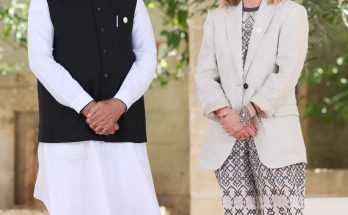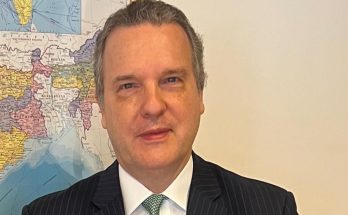
JERUSALEM:Israel Prime Minister Benjamin Netanyahu’s visit to India in January 2018, the first visit by an Israeli PM to New Delhi in over a decade, is expected to galvanise development and agricultural cooperation between the two countries.
In a defining step, India and Israel forged “Strategic Partnership in Water and Agriculture” during Prime Minister Narendra Modi’s landmark visit to Israel in July this year. India and Israel also signed two pacts to enhance cooperation on water conservation and state water utility reform in India, and another agreement on agricultural cooperation. MASHAV, the Hebrew acronym for Israel’s Agency for International Development Cooperation, will shepherd this strategic partnership in years to come.
Manish Chand caught up with Ambassador Gil Haskel, the head of MASHAV, in Jerusalem to discuss the way ahead for India-Israel development partnership. In this interview, Amb. Haskel outlines plans for harnessing Israeli technology to make Indian agriculture less dependent on the vagaries of climate, and to stimulate a new green revolution in India.
- Q) Development cooperation is a central pillar of the burgeoning India-Israel relationship. Looking ahead, what are the major projects you have identified? In what areas do you see this development partnership advancing?
- A) First, India and Israel signed two documents (during Prime Minister Modi’s visit in July) — one of them envisages a three-year work programme between MASHAV and the Ministry of Agriculture of India on capacity building and technical support for 2018-2020. This cooperation will be centered on nurturing what we are doing already. We have 15 Centres of Excellence that have been already established and are fully operational. We are now planning to have roughly 15 more and these will be inaugurated hopefully within one or two years. The whole idea of MASHAV is to share the Israeli experience and Israeli know-how in development, which is very unique, with the Indian farmers and economists in order for them to implement them, on the lines of what has been done in Israel, in all corners of India.That’s why the cooperation has been so widespread and basically these centres are there all through the Indian sub-continent.
- Q) There is plan to convert these Centres of Excellence into business hubs. How will it be achieved?
- A) MASHAV has been around for 50 years. We have discovered that in order for the project to be fully sustainable, it has to have some sort of private sector involvement. Although some directions have been established as a government-to-government exercise, at the end of the day they have to be handed over to the private sector for continuous operations, and then to be sustainable. It’s only a private sector centre that will produce agricultural products and sell it to the market or export it. The private sector’s involvement will allow the centre to absorb new technologies that will be also economical and viable technologies for the future.
- Q) How do you see India-Israel cooperation progressing in the area of food security?
- A) Mainly, we are talking about vegetable crops and different food crops. We are also hoping to enter into different kinds of animal husbandry like dairy farming and fish farming. These are the main focus areas.
We are here to address the issue of food security, water security, the water we use for agricultural purposes – these are the things we are discussing with India, through our very active embassy in India and the proactive MASHAV office in New Delhi.
- Q) What about Israeli involvement in Ganga cleaning? Does it also come under your department?
- A) Not totally, because this involves technology and the private sector is active in this area. This is a very exciting and symbolic project of cleaning the Ganga.
First of all, the whole issue of technology, water efficiency, the water we use also comes under MASHAV. There is some connection with the Ganga project and we are about to launch some MASHAV water solution projects.
- Q) What is unique and special about development partnership between India and Israel?
- A) Israel has a very unique development experience.Israel is the only country in the modern era that was established from scratch. One hundred years ago, there was nothing on the land on which we are standing on at the moment.
Tel Aviv was a non-existent city.Jerusalem was the very ancient city, within the walls; so 100 years down the line, we are a developed country and this experience of developing agriculture in arid zone, coming from nothing, is a very unique experience we are willing to share with India. India has a huge land coverage of desert, arid and semi-arid land, and we can bring the Israeli experience and expertise into India. We want to assist India with turning into a totally non-dependent country on climate, but totally dependent on technology and man-made solutions– this is an area in which Israel has unique expertise.
India has a huge land coverage of desert,arid and semi-arid land, and we can bring the Israeli experience and expertise into India. We want to assist India with turning into a totally non-dependent country on climate, but totally dependent on technology and man-made solutions– this is an area in which Israel has unique expertise.
Author Profile
- India Writes Network (www.indiawrites.org) is an emerging think tank and a media-publishing company focused on international affairs & the India Story. Centre for Global India Insights is the research arm of India Writes Network. To subscribe to India and the World, write to editor@indiawrites.org. A venture of TGII Media Private Limited, a leading media, publishing and consultancy company, IWN has carved a niche for balanced and exhaustive reporting and analysis of international affairs. Eminent personalities, politicians, diplomats, authors, strategy gurus and news-makers have contributed to India Writes Network, as also “India and the World,” a magazine focused on global affairs.
Latest entries
 In ConversationJuly 26, 2024India-Italy defence collaboration can extend to third countries: Anil Wadhwa
In ConversationJuly 26, 2024India-Italy defence collaboration can extend to third countries: Anil Wadhwa In ConversationJuly 23, 2024Italy views India as a key partner in Indo-Pacific: Vani Rao
In ConversationJuly 23, 2024Italy views India as a key partner in Indo-Pacific: Vani Rao DiplomacyJune 29, 2024First BRICS unveils a roadmap for boosting tourism among emerging economies
DiplomacyJune 29, 2024First BRICS unveils a roadmap for boosting tourism among emerging economies India and the WorldJune 11, 2024On Day 1, Jaishankar focuses on resolving standoff with China
India and the WorldJune 11, 2024On Day 1, Jaishankar focuses on resolving standoff with China






